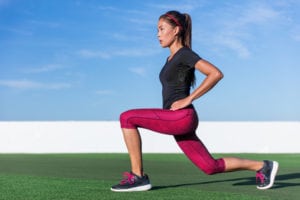You can prevent varicose veins, with a little help from your Houston vein specialists. When you develop varicose veins, it’s typically because your vein walls and valves have sustained damage. Often, that damage occurs because of a combination of two factors: compromised blood flow and increased pressure. When the valves in your veins don’t work well, blood has a hard time flowing back to your heart. When it can’t flow back to your heart, the blood builds up in your legs. And when the blood builds up in your legs, it puts a lot of pressure on the walls of your veins. That’s when they start to stretch and bulge, and become visible through your skin.

Symptoms of varicose veins include:
Certain factors, like your age, pregnancy and family history all increase your risk of developing varicose veins. Your job can also drastically increase your varicose vein risk. In fact, medical professionals, and professional drivers, or others who travel by car or plane for their jobs, are at an increased risk.
All day standing is also a big risk factor for vein health problems. And that’s why restaurant and retail staff, hairdressers and barbers, and people who work on assembly lines are very vulnerable to vein disease.
But there are measures you can take to lower your risk of developing varicose veins, and may improve the appearance of existing ones.
Water can improve blood flow and strengthen the muscles that support your veins. But how much water is enough? On average, you need to drink 8 ounces of water every two hours. But if you're larger than average, or exercise more (see below), you'll need more fluids.
You should also avoid dehydrating foods and drinks, especially ones with lots of salt (sodium.) Instead, choose foods with high-water content. We especially recommend cantaloupe, watermelon, strawberries, peaches, and oranges. And, on the veggie side, cucumbers, celery and zucchini are all great options.
Smoking and consuming excess amounts of alcohol can cause vein damage and impede your circulation. Plus, alcohol can strain your vessels by elevating blood pressure. So, if you want to prevent varicose veins, cutting back on both habits can reduce your risk.
Getting regular exercise helps improve blood flow in your legs—walking several times a week, for at least 30 minutes each time, will strengthen your calf muscles and improve your blood flow. Both will help prevent blood from pooling in your legs and putting pressure on your vein walls.
Whenever you get the chance to take a break, sit down and get your feet up (ideally above the level of your heart. Or try putting your legs against the wall, if possible, for extra benefits.) That should help get blood flowing back where it belongs.
Standing or sitting for long periods of time can take a toll on your veins. If you can get up and move around, or sit down and take a load off, at least once an hour, this will minimize the toll taken on your veins.
The closer you are to your ideal weight, the less pressure you put on your veins, and the better your entire circulatory system will function.
The closer you are to your ideal weight, the less pressure you put on your veins, and the better your entire circulatory system will function.
While all of these factors can help decrease your chances of developing varicose veins, if you have an increased risk of vein disease, you should stick to regular visits with our vascular specialists. That way, if problems do develop, we can catch and treat them as soon as possible. So, if you're overdue for your vein health check-up, schedule an appointment schedule an appointment schedule an appointment with our team right away!

Scheduling
Please contact our dedicated specialists to schedule a consultation today.
2024 Texas Endovascular. All rights reserved. Website Design by Healthcare Success